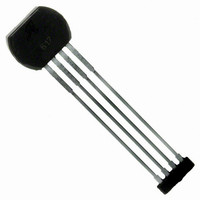ATS617LSGTN-T Allegro Microsystems Inc, ATS617LSGTN-T Datasheet - Page 13

ATS617LSGTN-T
Manufacturer Part Number
ATS617LSGTN-T
Description
IC HALL EFFECT GEAR SENSOR 4SIP
Manufacturer
Allegro Microsystems Inc
Type
Special Purposer
Datasheet
1.ATS617LSGTN-T.pdf
(16 pages)
Specifications of ATS617LSGTN-T
Package / Case
4-SIP
Sensing Range
60G
Voltage - Supply
4.5 V ~ 24 V
Current - Supply
12mA
Current - Output (max)
55mA
Output Type
Digital, Open Collector
Features
Gear Tooth Type
Operating Temperature
-40°C ~ 150°C
Output Current
45mA
Bandwidth
15kHz
Supply Voltage Max
24V
Hall Effect Type
Gear Tooth
Operating Temperature Range
-40°C To +150°C
Supply Voltage Min
4.5V
Lead Free Status / RoHS Status
Lead free / RoHS Compliant
Other names
620-1326-2
Available stocks
Company
Part Number
Manufacturer
Quantity
Price
ATS617LSG
Peak Detecting vs. AC-Coupled Filters High-pass filter-
ing (normal AC coupling) is a commonly used technique for
eliminating circuit offsets. However, AC coupling has errors at
power-on because the filter circuit needs to hold the circuit zero
value even though the circuit may power-on over a large signal.
Such filtering techniques can only perform properly after the
filter has been allowed to settle, which typically takes longer than
1s. Also, high-pass filter solutions cannot easily track rapidly
changing baselines, such as those caused by eccentricities. (The
term baseline refers to a 0 G differential field, where each Hall-
effect element is subject to the same magnetic field strength; see
figure 3.) In contrast, peak detecting designs switch at the change
in slope of the differential signal, and so are baseline-independent
both at power-on and while running.
Peak Detecting vs. Zero-Crossing Reference The usual
differential zero-crossing sensor ICs are susceptible to false
switching due to off-center and tilted installations that result in a
shift of the baseline that changes with air gap. The track-and-hold
peak detection technique ignores baseline shifts versus air gaps
and provides increased immunity to false switching. In addition,
using track-and-hold peak detection techniques, increased air gap
capabilities can be expected because peak detection utilizes the
entire peak-to-peak signal range, as compared to zero-crossing
detectors, which switch at half the peak-to-peak signal.
Power-On Operation The device powers-on in the Off state
(output voltage high), irrespective of the magnetic field condi-
tion. The circuit is then ready to accurately detect the first target
edge that results in a high-to-low transition of the device output.
Figure 7. The magnetic profile reflects the geometry of the target, allowing the device to present an accurate digital output response.
Target
Mechanical Profile
Target
Magnetic Profile
IC Output
Switch State
IC Output
Electrical Profile
Target Motion from
Pin 1 to Pin 4
IC Output
Electrical Profile
Target Motion from
Pin 4 to Pin 1
V
V
B
OUT
OUT
B+
IN
V+
V+
Dynamic, Self-Calibrating, Peak-Detecting, Differential
On Off On Off On Off On Off
Undervoltage Lockout (UVLO) When the supply voltage,
V
device is off and stays off, irrespective of the state of the mag-
netic field. This prevents false signals, which may be caused
by undervoltage conditions (especially during power-up), from
appearing at the output.
Output. The device output is an open-drain stage. An external
pull-up (resistor) must be supplied to a supply voltage of not
more than V
Output Polarity. The output of the unit will switch from low
to high as the leading edge of a tooth passes the branded face of
the package in the direction indicated in figure 6. This means that
in such a configuration, the output voltage will be high when the
package is facing a tooth. If the target rotation is in the oppo-
site direction relative to the package, the output polarity will be
opposite as well, with the unit switching from low to high as the
leading edge passes the unit.
Figure 6. This left-to-right (pin 1 to pin 4) direction of target rotation
results in a high output signal when a tooth of the target gear is nearest
the branded face of the package. A right-to-left (pin 4 to pin 1) rotation
inverts the output signal polarity.
CC
, is below the minimum operating voltage, V
Hall Effect Gear Tooth Sensor IC
On
CC
Rotating Target
Signature Tooth
(max).
Off
115 Northeast Cutoff
1.508.853.5000; www.allegromicro.com
Allegro MicroSystems, Inc.
Worcester, Massachusetts 01615-0036 U.S.A.
On Off
On Off
1
4
On Off
CC(UV)
Branded Face
of Package
, the
13












